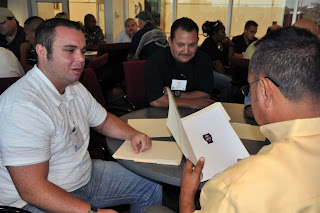 Police trainers test the sequential method of photo lineups recommended in a model policy developed by LEMIT.
Police trainers test the sequential method of photo lineups recommended in a model policy developed by LEMIT.Law enforcement instructors from across Texas participated in the inaugural training for eyewitness identification procedures offered by the Law Enforcement Management Institute of Texas at Sam Houston State University.
A total 61 representatives from state agencies, police departments, sheriff and constable offices, and school and campus police participated in a “Train the Trainer Program,” which provided information on the day-to-day applications of the policy in the field so they could teach officers in their agencies or region how to conduct the practice properly. It is one of four trainings offered by LEMIT and eight trainings provided by the Texas Police Chiefs Association.
“This train the trainer is designed to get the teaching materials out to the entire state,” said Dr. Rita Watkins, Executive Director of LEMIT.
Texas leads the nation is the number of criminal cases that have been overturned by faulty eyewitness identification practices. The Texas Legislature charged LEMIT with developing a model policy and procedures based on scientific evidence and best practices that could serve as a guide for Texas law enforcement. All Texas agencies that use eyewitness identification are required to adopt a policy by September 2012.
The trainers received materials, instruction and hands-on practice in conducting photo and live line ups as well as “show up” procedures, where suspects are presented to witnesses to identify shortly after a crime occurs. Based on 30 years of research, LEMIT recommends the use of blind or blinded sequential procedures, but showed instructors how to reduce false identification through other methods. In a blind sequential process, witnesses are shown photos one at a time by someone who does not know who the suspect is. A blinded process is done by an investigator in the case who does not know the order in which the photos are shown so no cues can be provided about the suspect.
 Participants demonstrate the six-pack method, which is not recommended by the LEMIT policy.Many agencies traditionally have used a simultaneous process, where photos are shown all at once. In addition to the process used, the training also provided information on how to select photos or fillers for the lineup, instruction that should be read and signed by witnesses, methods of documenting the procedure, and how to address witnesses who are illiterate or have limited English proficiency.
Participants demonstrate the six-pack method, which is not recommended by the LEMIT policy.Many agencies traditionally have used a simultaneous process, where photos are shown all at once. In addition to the process used, the training also provided information on how to select photos or fillers for the lineup, instruction that should be read and signed by witnesses, methods of documenting the procedure, and how to address witnesses who are illiterate or have limited English proficiency.
LEMIT discourages the use of show up procedures because they tend to be very prejudicial. They should only be used when necessary and should be limited to within two hours of the crime. While safety issues are paramount, whenever possible, the suspect should not be brought in a patrol car, handcuffed or restrained in any way. If there is more than one eyewitness, a show up should only be used with one witness, while the remaining witnesses should view a photo or live lineup.
Trainers also received background information on the research, legal cases, and the legislation as well as 60 Minutes video on a case study of a North Carolina man who was wrongly convicted of rape. LEMIT also received feedback from the trainers on issues they face in the field and how to clarify content in the training materials that will be provided to law enforcement agencies.
The eight-hour session was led by faculty and staff from LEMIT, SHSU and the Texas Police Chiefs Association. They urged law enforcement instructors to confer with the district attorneys in their counties to customize their policy and practices.
LEMIT presented “Train the Trainer” sessions in Plano and Huntsville and its final training will be held on July 11 in Austin. For more information on the LEMIT sessions, visit www.lemitonline.com. The Texas Police Chiefs Association plans to offer up to eight sessions to train representatives from smaller agencies in the state on the model policy.
“LEMIT is fortunate in being a training provider because of a grant from the Court of Criminal Appeals,” said Dr. Watkins. “Judge Barbara Hervey was very helpful.”